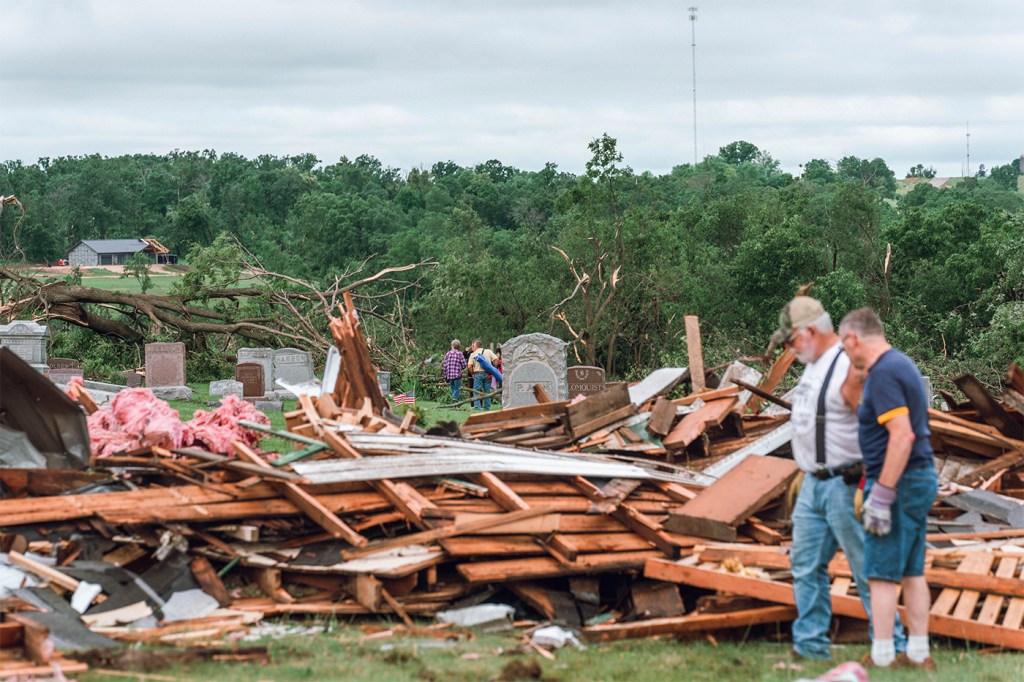Donald Trump ‘has a new lease on life.’ Can a traumatic event like surviving a shooting change a person’s personality?
Traumatic events like an assassination attempt can lead to a perspective shift, a Northeastern expert says.

Former President Donald Trump took a positive tone when President Joe Biden called him after Trump had been shot in the ear during an assassination attempt at a campaign rally in Pennsylvania on July 13.
Trump said his call with Biden was “very nice,” a shift from the usual vitriol the candidates direct at each other. Trump also said the near-death experience had an impact on him, a sentiment echoed by Sen. Lindsay Graham, who said the former president “feels like he has a new lease on life.”
It’s common for people to experience a shift in perspective when they go through a near-death experience, whether it’s a shooting, natural disaster hitting your home, or a serious illness, says Laurie Kramer, an applied psychology professor at Northeastern University.
Kramer unpacked some of the ways a brush with death might change people. Her responses have been edited for clarity and brevity.
Can a person’s personality change after going through a near-death experience?
Yes, absolutely. When you go through any kind of event like that, that creates so many different types of reactions, thoughts, emotions, changes in your relationships, and changes in your behaviors, in so many different ways.
What kinds of changes or emotions might someone experience after having a brush with death?
Featured Posts
There’s probably many changes that fall on a continuum with two different extremes. On the one hand, there are people that will definitely conceptualize this event as dodging a bullet. For whatever reason, they have been given another shot at life and it opens up new ways of looking at the world and at themselves. They may have a new understanding that their life and the lives of the people that they love could change in an instant. That might lead them to spend the time that they do have in the ways that are going to be the most meaningful to them. It may mean devoting more time to their relationships, their families, to other endeavors that they find important.There are very few people who are on their deathbed say ‘I wish I had spent more time at work.’
I’ve heard Trump saying ‘if I hadn’t turned my head in a certain way, my head would have been shot.’ (For some), recognizing the danger they faced can really reinforce the (trauma). It could create a great deal of anxiety, fearfulness and worry. It could mean adopting a perspective where people see the world as a dangerous place and being more protective of themselves. This might be the other extreme of the continuum.
We may see some symptoms of post-traumatic stress, which might mean replaying or perseverating over the events, plus some difficulties with sleeping or eating or going about their normal lives. Post-traumatic stress disorder can be very debilitating for people and going through an event like that could certainly launch that.
What is post-traumatic stress disorder (PTSD) and is everyone coming out of a situation like this going to have symptoms of it?
It’s not just going through a stressful or traumatic event. It’s the emotional, cognitive, and behavioral reactions that one has afterwards. You can see responses that range from anxiety and depressive symptoms. People replay the traumatic event in their heads over and over again. People’s abilities to process stressful events, make meaning of them, and regulate their emotions are going to be very, very different.
An important component of coping it is the emotional reactions that people have to it and how they come to understand the events. If they can form an understanding about what happened, that will help them feel more comfortable and confident about going back and resuming their normal activities.

Is there a distinction between something like PTSD and a shift in perspective or personality from a near-death experience?
We can be shaken by a terrible event that happened to us. But if we have some adaptive ways to understand that and, and help us address our feelings about it, that may help us move forward in a more adaptive way.
If someone does change from trauma, is that always permanent?
I don’t believe that it is always permanent. We have all heard stories about people who have been given a terrible medical diagnosis or been in the crosshairs of shootings. At that time they’re trying to protect themselves the best that they can, they’re engaging in behaviors to save themselves and others.
Maybe they bargain with a higher power. I’ve heard people say ‘If I’m saved this time, I will give up smoking.’ That’s likely not a long-term promisee they will keep. People tend to go back to normal life over time. They may reason, ‘Oh, that was a really bad thing that happened. It’s behind me now.’ And before too long, they go back and keep smoking.
What are some steps that people can take when coping with a traumatic event?
Find ways to talk about what happened with people that you feel safe with, who will accept and try to understand your experiences. Maybe that can happen with a close friend or family member. Other times, a mental health counselor may be the most helpful.
Sometimes support groups can (help) individuals through a unique traumatic event because they may really feel that this group of people, even though they’re not professionals, this group of people had that lived experience and have a better grasp on all the nuances and dimensions of their experiences that a professional might not.
Realize that this is sort of a marker in your life that might open up the door to positive changes as well. Realizing that life is precious and time is short might lead people to reinvest a lot of their own effort and energy into really more meaningful activities like their relationships.





